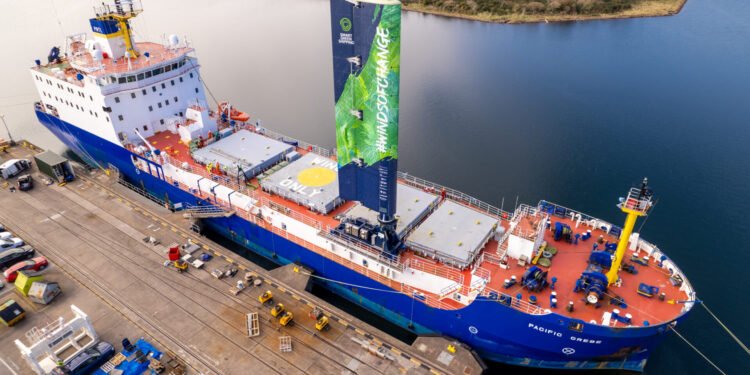In a move toward sustainable maritime transport, an experimental wind-powered cargo ship, the Pacific Grebe, has docked in Southampton to commence sea trials. The 5,000-tonne cargo vessel has been retrofitted with a cutting-edge 20-metre (65ft) wing-sail designed to harness wind power.
This ambitious project is spearheaded by scientists from the University of Southampton, who are conducting controlled sea trials to evaluate the ship’s performance under various conditions in UK waters. Dr. Joseph Banks from the university’s Marine and Maritime Institute emphasized the potential of this technology as a “key component” in transitioning towards zero-carbon shipping.
The innovative FastRig retractable test sail, developed by Smart Green Shipping with UK government funding, aims to make large vessels more environmentally friendly by potentially reducing carbon emissions by up to a third. Dr. Banks stated, “Fitting 21st Century autonomous sails to commercial ships could immediately reduce energy demands and fuel consumption, lower costs, and, importantly, cut CO2 emissions.”
International shipping is a significant contributor to global emissions, accounting for an estimated 837 million tonnes of CO2 annually, or 2.1% of total emissions. The Pacific Grebe’s sea trials will compare real-world data with predicted fuel savings on longer journeys, providing valuable insights into the viability of wind power in commercial shipping.
Di Gilpin, Chief Executive of Smart Green Shipping, highlighted the urgency of the project in the context of the climate crisis, stating, “We are facing a climate and nature emergency that requires innovation to rapidly reduce greenhouse gases – this is the race of our lives.”
The Department for Transport estimates that up to 40,000 ships, mainly tankers and bulk carriers, could potentially be adapted for wind power. The University of Southampton’s maritime experts, including Dr. Martyn Prince, have been instrumental in developing maritime innovations globally. Dr. Prince stressed the importance of accurately predicting fuel savings from wind to instill confidence in ship owners considering this technology.
“There are wind-assist technologies in development, but few have had their predicted fuel savings independently verified at sea. Wind power harnessed using well-engineered equipment and backed by data provided by these predictive tools offers one of the most effective ways for the sector to reduce emissions,” Dr. Prince added.
As the Pacific Grebe embarks on its sea trials, the maritime world watches closely, hopeful that this innovative approach will pave the way for a cleaner, more sustainable future in global shipping.

































